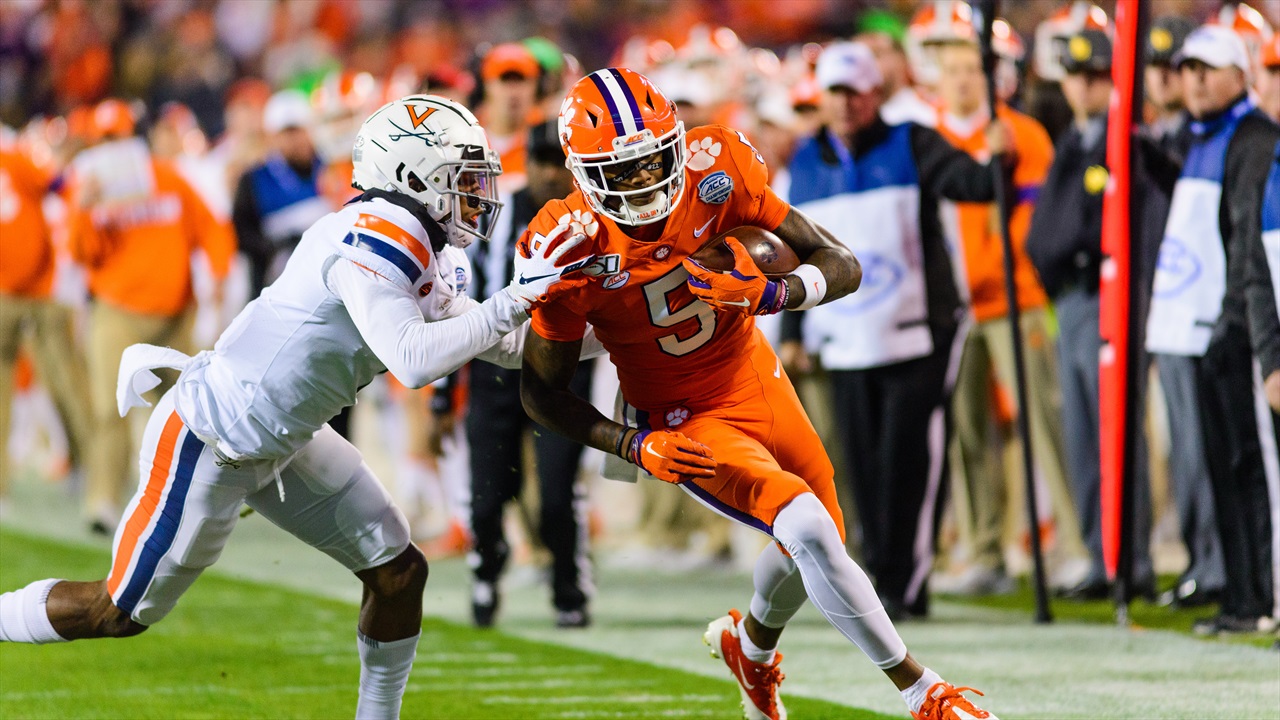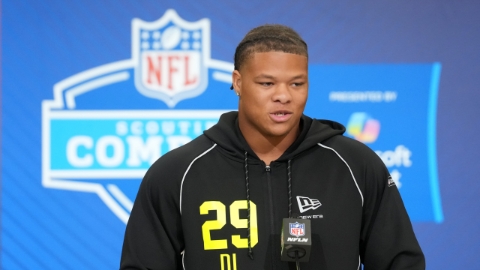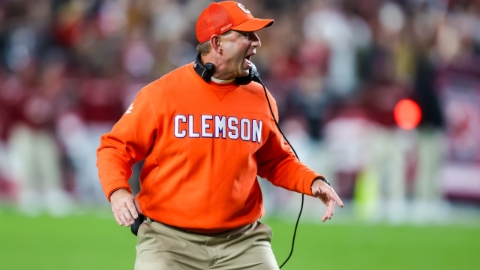
Opening Statement:
ROB MULLENS: Good afternoon. At 10:50 last night, the committee gathered. We met until 1:00 in the morning, and we met again this morning beginning at 8:00 a.m. Our rankings are complete, and you've seen them. The committee ranked LSU No. 1, Ohio State No. 2, Clemson No. 3 and Oklahoma No. 4. Here's why: The committee holds LSU and Ohio State in the highest regard. We flipped them between 1 and 2 three times this season. That's what happens when you work off of a clean sheet of paper with two teams that are so closely matched. LSU's dominating performance against an excellent Georgia team was a final piece of information that influenced the committee's vote. LSU's wins were against Georgia, Florida, Auburn and Alabama, ranked 5, 9, 12 and 13. The committee favorably compared that to Ohio State's wins against Wisconsin twice, Penn State, Michigan and Cincinnati, ranked 8, 10, 14 and 21. Clemson continued its powerful performance against everyone it played. It is true that they do not have the same strength of schedule as some other schools, but the committee believes they are so strong and so dominant that they are the No. 3 team in the nation. Oklahoma is 3-0 against top-25 teams and 2-0 against the top 10. They helped themselves with their overtime victory against a good Baylor team and obviously were helped by Georgia's loss to LSU. It is worth noting that each of the top 4 teams is also a conference champion. The highest ranked Group of Five champion this year is No. 17, Memphis. As for the New Year's Six bowls, here's who's playing. No. 5 Georgia will play No. 7 Baylor in the Sugar Bowl; No. 6 Oregon will play No. 8 Wisconsin in the Rose Bowl; and No. 9 Florida will play No. 24 Virginia in the Orange Bowl; No. 10 Penn State will play No. 17 Memphis, the highest ranked Group of Five champion, in the Cotton Bowl. This is my final year on the committee, and if you'll allow me, this has been a privilege. Each of us on the committee served because we wanted to put something back into the game we love. It's a lot of work. A lot. But that's the way it should be, and I'm grateful to the members of the committee, impressed by their commitment and dedication. Our job is to get it right. We work hard every week to do just that. I believe we've done so again this year. Frank Beamer, Chris Howard and I will graduate from the committee this year. None of us will miss the travel, but we will miss the committee. It's been an honor serving. Thank you to you, as well, for what you do as journalists who also love the game. Happy to answer any questions.
Q. I think I heard you tell Reese that you assigned committee members to state a case for each of those undefeated teams at No. 1. Who stated the case for Ohio State and LSU, and what were the cases beyond top-25 wins?
ROB MULLENS: Yeah, I don't want to disclose who we asked to do that because sometimes they were appointed. But we did want to make sure that somebody presented the resume for each of those. We went through it like we do every week. You're looking at the full resume, wins against ranked opponents, how they're performing, and with those, because they are such good teams, we were getting into each phases of the game. The difference in the end was for the 1 and 2, the games against ranked opponents, and not only against the ranked opponents but where they were ranked. LSU's dominant performance against what was the No. 4 team, ended up being the No. 5 team, and their defense has really improved the last couple of weeks, and obviously the excellent play of Joe Burrow.
Q. You said on the television broadcast that the Georgia-Oklahoma thing was a discussion. First of all, what was the case for Georgia with two losses and a non-conference champion and how intense were those discussions?
ROB MULLENS: I wouldn't call them intense. We wanted to be thorough. It was more focused on being thorough. But the case for Georgia is their wins against ranked opponents and the strength of their defense. Similar to what it's been all year. They've got three real Rev #1 by #166 at 2019-12-08 21:21:00 GMT page 1 of 4 quality wins.
Q. Sort of along those lines, how would you characterize the discussion for the top four? I know obviously 1 and 2 were difficult, but as far as the top four, was it easier this year than it's been in the years that you've been on the committee?
ROB MULLENS: You know, I would never classify it as easier. Last year there were three teams, and we had a long debate with varied resumes for No. 4. We didn't have that element this year. I think you've seen our rankings and heard us discuss throughout the whole process. We've got three undefeated conference champions at 1, 2 and 3 who have performed at a consistently high level. So that piece has been there. So each year is unique, and yes, at the end we didn't have that intense debate with three teams for one spot.
Q. I know each season is its own season, each team is its own team, but when you look at in terms of Oklahoma, they made the playoff the last couple years with a defense that was not ranked very high, I think last year 114th in the country. This year you look at them, they're 24th. So a jump of 90 spots in the NCAA rankings. I'm just curious, how did the committee discuss that? Can you illustrate it for us, how Oklahoma's defense was discussed?
ROB MULLENS: Sure. Again, we watched the games. We get a lot of data, as well, so we're looking at full resumes, results against all opponents. And then we see a lot of numbers, too, so not only do we watch the games and see how they're performing, but we can evaluate the data, as well, and when we're evaluating against other teams, we put those up to four resumes on the board at the same time, which is a great tool to be able to spark discussion and point to certain things, whether it be on the schedule with results or within the data.
Q. Just wanted to ask if you could kind of expand on the separation between Penn State and Wisconsin and kind of how you size that up after the Big Ten title game.
ROB MULLENS: Yeah, obviously Penn State won their division. Two really good teams. Both have quality wins against ranked opponents. As you've seen, when Wisconsin had the big win, they jumped over, and I think we felt that with the way they performed in the Big Ten Conference championship, they deserved to stay ahead.
Q. I'm not sure how much you were asked already about Ohio State versus LSU, but I guess did something about Ohio State's resume in your mind change just based on the first half of the Big Ten Championship game, or how much of a factor was that in how things shook out?
ROB MULLENS: Well, we've been asked about it a lot. I think these are two teams that have been really close the entire time, and as we've explained, every weekend one of them has done something to move above the other. I think last night in watching the championship game, LSU's performance against a No. 4 ranked Georgia propelled the committee to put them just ahead of Ohio State in 1 versus 2. Did last night's games play a role? Sure they did. Every game plays a role, and I think it was more about LSU's strong dominant performance over a No. 4 ranked team that elevated them to No. 1.
Q. I think you touched on it a bit already, but in the case of Wisconsin, how much did the committee factor in the way they lost to Ohio State in the Big Ten Championship, the way they kept it close, when you got to the Rose Bowl argument, as opposed to the fact that they had lost three games in total this season?
ROB MULLENS: Well, I think what really carried the day is they've got three wins against top-25 teams. The No. 14 Michigan, No. 16 Iowa, and No. 18 Minnesota. You know, and then there's lots of common opponents because in the same league. I think that's where it really carried today. Obviously the way they played last night, particularly in the first half, was something that was noticed by the committee. But in the end, their three wins against CFP top-25 wins really impressed the committee.
Q. At the end of the year you guys have all the resumes in totality and you can stack them up against each other one by one, X many wins against top-25 opponents and all that stuff. But I was wondering when you look at a schedule and how it lays out, do you guys weigh in in any way if a team has to play top-15 opponents in consecutive weeks or three weeks in a row, and how does that factor into a resume? Is it just here's how many wins they have against top-25 opponents or does the fact that a team wins those games consecutively and they're probably pretty tough circumstances, like that impacts the way you view them?
ROB MULLENS: Again, when we put those resumes on the board, we see the games in sequential order. And we see what the rankings are. So we recognize that, and that's a piece of it. But so is the entire resume.
Q. Is there a distinction between a team beats the 14th, 12th, 16th teams on their resume, and if they beat them all in a row, does it carry more weight? Do you see what I'm saying? Or is it just what it is at the end?
ROB MULLENS: Well, it probably depends. When you're comparing them against a team that beat No. 5, No. 9, No. 12 and No. 13, that's all part of the conversation. Sure, the sequence is discussed and who they beat is discussed, but so is another team's resume who's beaten highly ranked teams, as well.
Q. I saw that you said there was not a very intense debate between Georgia and Oklahoma there after the games were played last night. Do you kind of characterize that sort of debate that you would have as sort of just doing your due diligence? Is that how thorough the process is? Or was there an actual sort of back-and-forth there about which team could get in?
ROB MULLENS: There was some back-and-forth, but I think it's fair to say that we did our due diligence, making sure we were thorough and that we had it right.
Q. Without violating the sanctity of the discussions, can you talk about, I guess paint the picture of watching the Big Ten Championship game together, the value in being with the other committee members, and what can you say about what you guys were talking about last night when Ohio State was down 21-7 in the first half? Is there any sort of reaction you can share from within the room as the game unfolded and how the discussions contributed to the decisions?
ROB MULLENS: Sure, we don't really have the deliberations while the game is going on, but we're watching it just like you would watch it. We're oohing and aahing at big plays, we're talking about the strategy that's being employed and about certain players and how they're playing. But we save the debate until the results because things change and adjustments are made at halftime, and our job is to look at results. But we'll watch it just like you would watch it, oohing and aahing at big plays and seeing how it unfolds.
Q. What would you say to Pac-12 football fans, it's another year and they're not able to have a team in there. What's the Pac-12 need to do to get back into the College Football Playoff?
ROB MULLENS: Yeah, again, we don't evaluate things by conferences. You've got No. 6 Oregon and No. 11 Utah who were in the top 10 for several weeks, and so the Pac-12 was a part of that discussion. Just so happens that this year it didn't work out.
Q. You were kind of in a unique situation because neither Jeff Long or Kirby Hocutt had a team that was being discussed as a top-10 team. I was wondering what was that like for you? I know you had to recuse yourself. Was that any kind of a distraction for you when you got back in the room and you saw what the verdict was and things like that?
ROB MULLENS: No, this is my fourth year on the committee. I had seen Gene Smith, Joe Castiglione, Dan Radakovich and how the process works for the recusals. Obviously I'm a full believer in the process. Each of these members, as you know, checks their hat at the door. Integrity is the highest priority. We all want our teams to be in the conversation. I stood outside and paced, and like everybody that's recused, you anxiously await to get back in there, see what the results were, learn what the debate was and get ready to get back into it.
Q. Apologies there were technical issues earlier. I think we missed 10 minutes maybe of this. If you could just speak to what was the most compelling argument for moving LSU ahead of Ohio State?
ROB MULLENS: I think the most compelling argument -- these are two very close teams, as you've seen. I think in our six rankings, one has been No. 1 three times and the other has been No. 1 three times. As I mentioned earlier in the call, it's just a matter of one does something to move slightly ahead of the other, and this weekend LSU beat a highly-ranked, at the time, No. 4 Georgia team in an impressive fashion in the SEC Championship. That ended up being their fourth win against teams that are ranked 13 or higher in the final CFP poll. Their defense has improved and shown a lot over the last two weeks as they've gotten healthy, and once again, their outstanding quarterback play was on display last night.
Q. Because of the recusal I'm not sure if you know or can answer this, but if Georgia was part of the discussion for the fourth spot after Oregon's performance last night, was Oregon part of the discussion at all for that fourth spot?
ROB MULLENS: Just by the sequence of where they fall, they were, but the reality was I think the majority of the conversation was around Oklahoma and Georgia. And again, it was pretty clear that it was Oklahoma.
Q. I know you guys get to bed really late. I was wondering what time you actually went to bed, and you guys think a lot about coming back to this. What lingering questions did you have heading into this morning that you knew you guys would have to get back into today?
ROB MULLENS: What time did I go to bed personally? Well, I went back, and again, looked at the sheet, looked at the results, thought in my mind, as the chair, what are the things that we need to make sure that we put on the table to make sure that we've been thorough. And we do this every week, and make sure that we engage every member to make sure everybody that went back that night and reviewed it had an opportunity to put anything on the table to discuss, 1 through 25, and when we came back, everybody agreed that we should spend considerable time on 1 through 3 again, and then we wanted to visit the Group of Five again because of what that meant. Even though the rankings have been consistent, we wanted to do it one last time to make sure we were confident and 100 percent certain we got it right because of what was on the line. That was consistent with what I felt we needed to make sure we did. What time did I go to sleep? I don't even know. I kind of drifted out with the papers in my hand.
Q. Rob, with Penn State going to the Cotton Bowl, I was curious what the debate was in the room and the difference between Penn State and Utah for that spot.
ROB MULLENS: Yeah, I think, again, it comes down to the fact the committee was really impressed with Utah all year long. Similar to some other teams who hadn't had a similar strength of schedule. In the end here, when Utah had an opportunity to play against a ranked team, a team that was ranked lower than them, unfortunately they lost, which kind of was a separator for them. When you compare that to Penn State who beat a No. 14 Michigan, won at a No. 16 Iowa and had a quality non-conference win against a Pitt, that ended up being the separator for those two teams.



